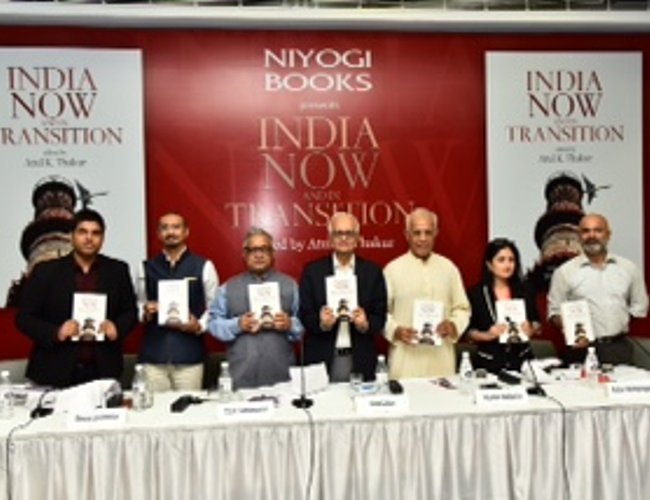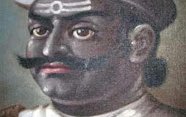
Edited by Atul K Thakur and published by Niyogi Books, India Now and In Transition were officially launched at India International Centre, 40, Max Mueller Marg, New Delhi. The book is compiled in the memories of Late BG Verghese, Former Editor – Indian Express and Hindustan Times.
The book was launched by the Session Chair Bimal Jalan, Former Governor, Reserve Bank of India, Atul K Thakur, Editor of the Book, Public Policy Professional and Journalist, TSR Subramanian, Former Cabinet Secretary of India, Wajahat Habibullah, Former CIC & Panchayati Raj Secretary, GoI, Dhruva Jaishankar, Senior Fellow, Brookings India, Omair Ahmad, Author, Journalist and Columnist , Pallavi Rebbapragada, journalist.
The book has 37 essays, contributed by among others, Ramachandra Guha, Shashi Tharoor, Wajahat Habibullah, TSR Subramanian, Omair Ahmad, Dhruva Jaishankar, Atul K Thakur, Jayati Ghosh, Reetika Khera, Rajeev Bhattacharjee, Kajal Basu, Tabish Khair, Manu Bhagavan, Samir Saran, Vinod Rai, Robin Jaffery.
While giving the opening remarks, Bimal Jalan has said that “The book is an excellent collection of 37 essays covering politics, culture and governance, security, language, economics, foreign policy. For all interested in South Asian affairs will be benefitted by this wide range of topics covered by the book. It covers India Now and in Transition. Jalan calls for an open discussion among the panelists.”
TSR Subramanian, a contributor of the book, has highlighted how the book covers a wide range of topic that immediately matter to India at cusp of big change and appreciated the contributors for knowing their subject so well while dealing with a complex theme called ‘India.’
Served as India’s Cabinet Secretary, he shared his disappointment on the non-functional and damaging acts of bureaucracy that has been keeping India way below its actual potential. He raised question over the falling performance of India on HDI and lack of reform in key areas concerning the masses, including health, education, employment, nutrition. He also criticized the GM Foods and lamented over giving it a node to India while serving country’s topmost executive post in early 1990s. He requested the book’s editor Atul K Thakur to come out with the next volume that will have complete focus on rural India.
Wajahat Habibullah, who has written this volume’s most detailed piece and that nun Kashmir, had shared while being in Jammu & Kashmir as an IAS officer. He shared “I had tried to focus on the people of Kashmir, but for failure of govt initiatives, the goodwill on ground that existed till late 1980’s withered away. In last seven decades, India has been facing a challenge in transition from a former colony into a nation. How did the syncretism give way to religious extremism? It is due to wrong Indian policies. The early 1990s witnessed the exodus of Pandits from valley and the Kashmir remained the same again. My colleagues and I have failed. The violent political movement were in the early 90s has its roots in anger at being let down. Frustration at the then state govt, stemming from sheikh Abdullah but now focus has moved to India which is seen as a Hindu state. Wrong governance and policies have led to this. Yet as much I know Kashmir and Kashmiriyat, I am optimist about the future despite noticing many challenges upfront.”
Dhruva Jaishankar said that now the world matters more for India while focusing on his topic “India’s relation with the rest of the world.” He shared “The world matters more for india and vice versa than they have ever done in history. Indian Diaspora, Indian tourists travelling abroad, India’s foreign trade (India is one of the largest importer of oil and defence equipment), everything is on the rise. All countries have a grand strategy. My essay is on India’s strategy in a non strategy age. Our adversaries have become more difficult and to define and our public debates have become more of a cacophony. I assess India’s resources and adversaries in my essay.”
Omair Ahmad put questions forward besides assessing the scenario that is making India’s economic hollow in absence of ‘inclusiveness’. He said, “What was our independence for? Only for the state? India’s freedom struggle was about individual freedom, but individual is missing from our current policies. I went to Bhutan in 2007; travelled through an area of utter destitution. This is the state of our international border. If my neighbor and co-citizens are suffering, how successful are we in providing security? This is a reflection on how we treat our own people. Three million people in our armed forces provided by the Indian state for external security…but for our insecurity against each other we citizens employ 5 million security guards paying from our own pockets. Is this what we envisaged at the start of our independence? Have we failed in providing security?”
Atul K Thakur, the editor of the book gave the outline of the book and how it started shaping as early as in 2013, when his first book was launched exactly four years back at same hall in IIC, “Mye first book (ed.), India Sinc 1947: Looping Back at. A Modern Nation(2013) was a collection of essays on a nation that was still trying to come into its own. If we consider the state of our nation today, in certain aspects India has come a long way, while in many others it has a challenging journey and many tough transitions ahead.
This sequel, India now and in Transition, is based on how ‘India’ is being shaped through contemporary political events and other key determinants. What this book intends is not a prognosis (which is often confused with prediction), but, rather, an inquiry into futures based on current happenings. This necessarily entails deconstructions of the past, as in the previous volume. A causal linearity is maintained, so that the futures proposed will be the likeliest. To that end, the exegesis is rigorously researched, referenced and argued. The book is not intended to be a mere warehouse of opinions. Together, the two volumes cover India's continuum from a nascent nation-state to a mature one. This book and the previous volume, focus especially on the consolidation of national democracy after 1947, calling it the next remarkable event after India’s independence—where the decisive leadership of Nehru played a major role. While examining all these changes, the book also indicates the next course of development as far as democracy in India is concerned.”
India now and in Transition is an enquiry into possible futures, based on current happenings. Featuring contributions from leading thinkers and scholars in diverse fields, each essay in this volume critically analyses a major theme of India's present, to propose the likely way ahead for our emergent nation. Covering the fields of politics and governance, economics and development, security and foreign policy, society and culture, and language and literature, the book shows that—while beset with both internal and external challenges on many fronts—India isn't waiting for its moment, it's making its moment happen.
- TANAHU HYDROPOWER PROEJCT: A Significant Achievement
- Apr 15, 2024
- AMBASSADOR HANAN GODAR: Sharing Pain With A Nepali Family
- Mar 30, 2024
- VISIT OF KfW AND EIB TO NEPAL : Mission Matters
- Mar 25, 2024
- NEPAL BRITAIN SOCIETY: Pratima Pande's Leadership
- Mar 24, 2024
- NEPAL ARMY DAY: Time To Recall Glory
- Mar 15, 2024
















